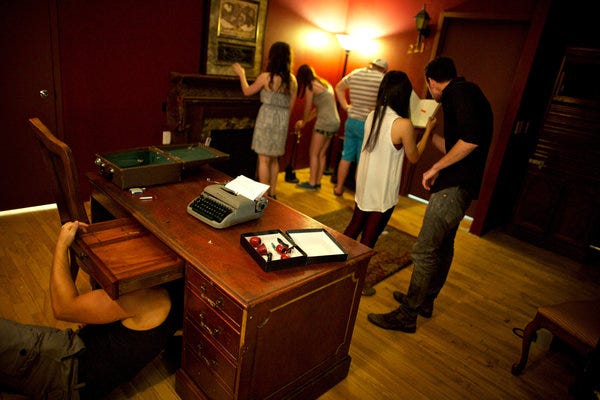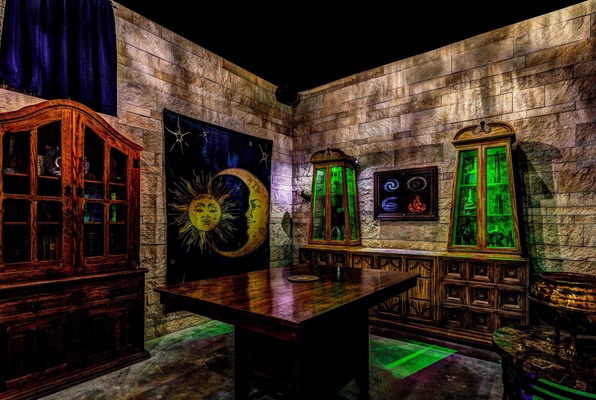Are You Up for the Difficulty? Try the Escape Room Seattle WA Today!
Are You Up for the Difficulty? Try the Escape Room Seattle WA Today!
Blog Article
Challenge Your Mind With Our Intriguing Escape Room Puzzles and Clues
Beginning on an escape space adventure supplies a diverse experience that mixes cognitive challenges with immersive narration. Each room, meticulously crafted with special themes, draws individuals into a world where logic, monitoring, and physical puzzles assemble.
The Art of Problem Style
The art of puzzle style in retreat rooms is a thorough and creative process that requires a deep understanding of both cognitive and psychological involvement. Crafting a successful challenge entails balancing complexity with solvability, ensuring that individuals remain tested yet not bewildered. This balance is vital, as it cultivates a feeling of accomplishment and advertises ongoing involvement.
Puzzle designers have to take into consideration various cognitive skills, such as pattern recognition, deductive reasoning, and spatial awareness. These elements ought to be intertwined perfectly within the narrative of the retreat space, boosting the immersive experience. Emotional interaction is similarly vital; puzzles need to stimulate curiosity, enjoyment, and periodic frustration, inspiring individuals to persevere and ultimately succeed.
Attention to detail is extremely important. Every clue, prop, and mechanism must be meticulously designed and evaluated to make certain capability and comprehensibility within the storyline. Designers frequently repeat on their developments, integrating comments from test teams to fine-tune problem levels and eliminate uncertainties.

Types of Escape Room Challenges
Understanding the complexities of challenge style naturally results in an exploration of the diverse types of challenges experienced in getaway rooms. These challenges can be broadly categorized right into physical problems, reasoning challenges, and empirical challenges, each offering distinct forms of engagement and cognitive stimulation.
Physical problems call for individuals to engage with their atmosphere, frequently involving jobs such as constructing things, adjusting systems, or discovering covert compartments. These obstacles involve tactile senses and spatial thinking, motivating teamwork and hands-on problem-solving.
Reasoning challenges, on the other hand, need logical thinking and pattern acknowledgment. Individuals may be tasked with translating ciphers, addressing mathematical issues, or finding links between seemingly unconnected hints - escape room seattle wa. These problems are developed to examine the gamers' deductive reasoning and intellectual prowess
Empirical challenges depend on eager attention to information. Players need to scrutinize their environments to identify refined hints, disparities, or hidden messages. These obstacles commonly necessitate an eagle eye and an ability to view links that others could neglect.
Approaches for Success
Achieving success in retreat rooms needs a thoughtful mix of technique and partnership. Teamwork is critical; gamers must take advantage of their cumulative strengths to fix complex puzzles effectively. Separating tasks according to private abilities can simplify the process-- those with a propensity for pattern acknowledgment can handle visual challenges, while sensible thinkers take on riddles and sequences.
Effective communication is one more keystone of success. Sharing explorations promptly avoids duplicated initiatives and makes certain every person continues to be on the same page. Using a central area to put discovered items can aid track progression and stay clear of missing out on critical clues.
Time management is equally important. Designate a certain quantity of time to every challenge, preventing extended emphasis on any single obstacle. If progress stalls, switching challenges or seeking assistance from teammates can provide fresh perspectives.
It's likewise useful to familiarize oneself with common escape area styles and challenge types ahead of time. Recognizing prospective puzzle formats, such as ciphers or lock mixes, can speed up problem-solving.
Last but not least, maintaining a positive and composed perspective discover this under pressure can dramatically impact efficiency. Anxiety can cloud judgment, so keeping tranquil guarantees clear reasoning and effective collaboration, bring about a higher likelihood of efficiently leaving.

Benefits of Escape Rooms
Participating in escape rooms offers a multitude of benefits that extend past plain entertainment. These immersive experiences function as a durable system for establishing important reasoning and analytical skills. Participants are called for to assess ideas, determine patterns, and create services under time constraints, fostering psychological dexterity and cognitive versatility.
Furthermore, escape rooms are an effective device for improving teamwork and interaction. The collective nature of these activities necessitates efficient interaction and coordination among employee. This atmosphere urges individuals to articulate their thoughts clearly, listen proactively, and job synergistically towards an usual objective, thus strengthening social skills.
Moreover, escape rooms give an exceptional avenue for stress and anxiety alleviation and mental restoration. The engrossing nature of the obstacles enables individuals to divert their emphasis from daily stress factors, promoting a feeling of achievement and health upon fixing the puzzles. This can result in boosted mental wellness and enhanced performance in other locations of life.
Lastly, these experiences usually need creativity and ingenuity, which can equate right into innovative analytical abilities in expert setups. By participating in getaway areas, individuals can refine a diverse ability that is appropriate in numerous real-world scenarios, making them a read the article useful enhancement to any specialist or personal advancement strategy.
Popular Themes and Circumstances
Delving into the varied globe of escape rooms exposes a myriad of preferred themes and scenarios that mesmerize individuals and enhance the immersive experience. Amongst the most beloved styles are those that deliver gamers into historical periods or fantastical realms. Ancient Egyptian tombs, medieval castles, and pirate experiences are perennial favorites, allowing participants to solve puzzles within richly detailed settings that evoke a feeling of experience and discovery.
One more prevalent theme is the mystery and detective style, where gamers locate themselves in the function of sleuths resolving a crime or uncovering secrets. These circumstances usually include complex storylines and a series of interconnected ideas that call for keen observation and deductive thinking to unwind.
Furthermore, science fiction and horror motifs hold considerable appeal, making use of the intrigue of advanced innovation or the thrill of browsing haunted residences and labs. These situations frequently include special effects and innovative props, enhancing the realistic look and tension.
Lastly, several getaway areas draw inspiration from prominent culture, developing experiences based on precious books, flicks, or TV programs. This can stimulate a feeling of experience and exhilaration, as participants involve with situations that admire their favored stories.
Final Thought
The elaborate layout of getaway room challenges and hints offers an one-of-a-kind blend of cognitive difficulties and immersive narration. By engaging in various kinds of physical, logical, and observational puzzles, participants refine critical thinking and team effort skills. Utilizing effective methods improves the general experience, highlighting the complex advantages of retreat spaces. Popular situations and motifs better enhance the experience, making escape areas a engaging and academic task for boosting mental acuity and analytical capabilities.
Each room, carefully crafted with one-of-a-kind styles, attracts participants into a globe where logic, monitoring, and physical challenges assemble.The art of challenge layout in retreat rooms is a creative and meticulous process that requires a deep understanding of both cognitive and emotional engagement. Crafting an effective challenge involves stabilizing complexity with solvability, guaranteeing that individuals continue to be tested yet not overwhelmed. The engrossing nature of the challenges enables individuals to divert their emphasis from everyday stressors, advertising a sense my explanation of accomplishment and health upon fixing the challenges.The complex style of escape room puzzles and hints offers a distinct blend of cognitive challenges and immersive storytelling.
Report this page